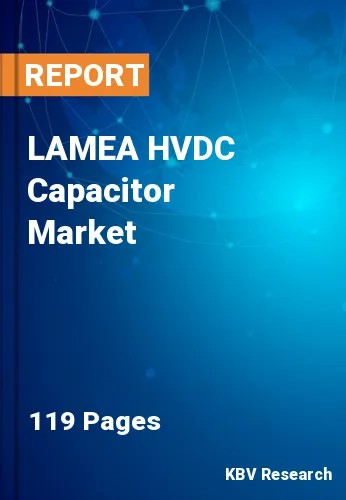The Latin America, Middle East and Africa HVDC Capacitor Market would witness market growth of 17.1% CAGR during the forecast period (2022-2028).
The 11th and 13th harmonics on the AC side and the 12th harmonic on the DC side are often handled by combinations of harmonic filters in line-commutated converters for HVDC. When dealing with the AC side's 23rd, 25th, 35th, and 37th... as well as the DC side's 24th, and 36th, high-pass filters may occasionally be offered. In some cases, dampening at lower-order, uncharacteristic harmonics like the third or fifth harmonic may also be required from the AC filters.
The task of designing AC harmonic filters for HVDC converter stations is difficult and computationally intensive because it must be ensured that the harmonic filters do not resonate with any other parts of the AC system, and the converter does not produce unacceptable levels of voltage distortion. AC filter design requires a thorough understanding of the harmonic impedance across a wide range of frequencies of the AC system.
Only HVDC transmission systems utilizing overhead lines require DC filters. The main design criterion for the DC filters is to make sure that the harmonic currents flowing in the DC lines do not create issues in nearby open-wire telephone lines because voltage distortion is not a problem in and of itself. After all, consumers do not directly connect to the DC terminals of the system. DC filters are becoming less significant for HVDC systems due to the advent of digital mobile telecommunication networks, which are significantly less susceptible to interference.
Among the Cahora Bassa Hydroelectric Generation Station at the Cahora Bassa Dam in Mozambique and Johannesburg, South Africa, there is an HVDC power transmission line called Cahora-Bassa. Electricity Supply Commission, later known as Eskom, Johannesburg, South Africa, and Hidroelectrica de Cahora Bassa (HCB), a company owned 15% by the government of Portugal and 85% by the government of Mozambique, collaborated on the Cahora-Bassa transmission project. ZAMCO, a collaboration between the German Siemens AG, Brown Boveri Company, and AEG-Telefunken JV built and provided the equipment.
The Brazil market dominated the LAMEA HVDC Capacitor Market by Country in 2021, and would continue to be a dominant market till 2028; thereby, achieving a market value of $229.9 million by 2028. The Argentina market is experiencing a CAGR of 17.7% during (2022 - 2028). Additionally, The UAE market would display a CAGR of 16.8% during (2022 - 2028).
Based on Technology, the market is segmented into Line-commutated Converter (LCC) and Voltage-source Converter (VSC). Based on Product Type, the market is segmented into Plastic Film Capacitors, Aluminum Electrolytic Capacitors, Ceramic Capacitors, Tantalum Wet Capacitors, and Others. Based on Application, the market is segmented into Energy & Power, Aerospace & Defense, Industrial, Commercial, and Others. Based on Installation Type, the market is segmented into Enclosed Rack Capacitor Banks, Open Rack Capacitor Banks, and Pole-mounted Capacitor Banks. Based on countries, the market is segmented into Brazil, Argentina, UAE, Saudi Arabia, South Africa, Nigeria, and Rest of LAMEA.
Free Valuable Insights: The Global HVDC Capacitor Market is Predict to reach $11.4 Billion by 2028, at a CAGR of 13.7%
The market research report covers the analysis of key stake holders of the market. Key companies profiled in the report include General Electric (GE) Co., Hitachi, Ltd., TDK Corporation, Yageo Corporation, Vishay Intertechnology, Inc., Eaton Corporation PLC, Kyocera Corporation, General Atomics, International Capacitors, S.A., and ELECTRONICON Kondensatoren GmbH.
By Technology
By Product Type
By Application
By Installation Type
By Country
Our team of dedicated experts can provide you with attractive expansion opportunities for your business.

